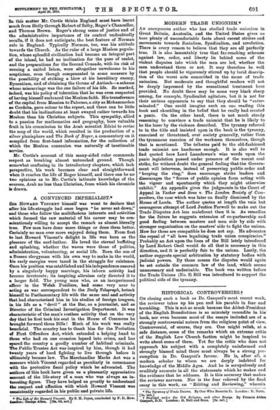A. CONVINCED 'IMPERIALIST.*
SIR HOWARD VINCENT himself was wont to declare that after his life-struggle had once begun "he never sat down," and those who follow the multifarious interests and activities which formed the raw material of his career may be con- scientiously willing to accept the remark as almost literally true. Few men have done more things or done them better. Certainly no man ever more enjoyed doing them. From first to last Howard Vincent's delight in life was keen as the pleasure of the surf-bather. He loved the eternal buffeting and splashing, whether the waves were those of politics, administration, volunteering, or social life. Born the son of a Sussex clergyman with his own way to make in the world, his early energies were taxed in the struggle for existence. Once his position was established and his independence assured by a singularly happy marriage, his inborn activity had become inveterate; its inspiring altruism only directed it to a larger field. The young man who, as an inexperienced officer in the Welsh Fusiliers, had come very near to acting as war correspondent to the Daily Telegraph, betook himself to Parliamentary life with the same zeal and activity that had characterized him in his studies of foreign tongues, in his life as a " devil " at the Bar, as a journalist, and as Director of the Criminal Investigation Department. It was characteristic of the man's restless activity that on the very day that he first took his seat in the House of Commons he brought forward three Bills ! Much of his work was really beneficial. The country has to thank him for the Probation of First Offenders Act, which extended a helping hand to those -who had on one occasion lapsed into crime, and has spared the country a goodly number of habitual criminals. The Public Trustee Act was inspired by him, though it had twenty years of hard fighting to live through before it ultimately became law. The Merchandise Marks Act was a measure which Vincent regarded as peculiarly in consonance with the protective fiscal policy which he advocated. The authors of this book have given us a pleasantly appreciative account of the life-story of a man who was always an in- teresting figure. They have helped us greatly to understand the respect and affection with which Howard Vincent was consistently regarded in his public and private life.
• The Life of Sir Howard Vincent. By S. II. Jeyes, concluded by F. D. How. London: George Allen. [12s. 6d. net.]


























































 Previous page
Previous page